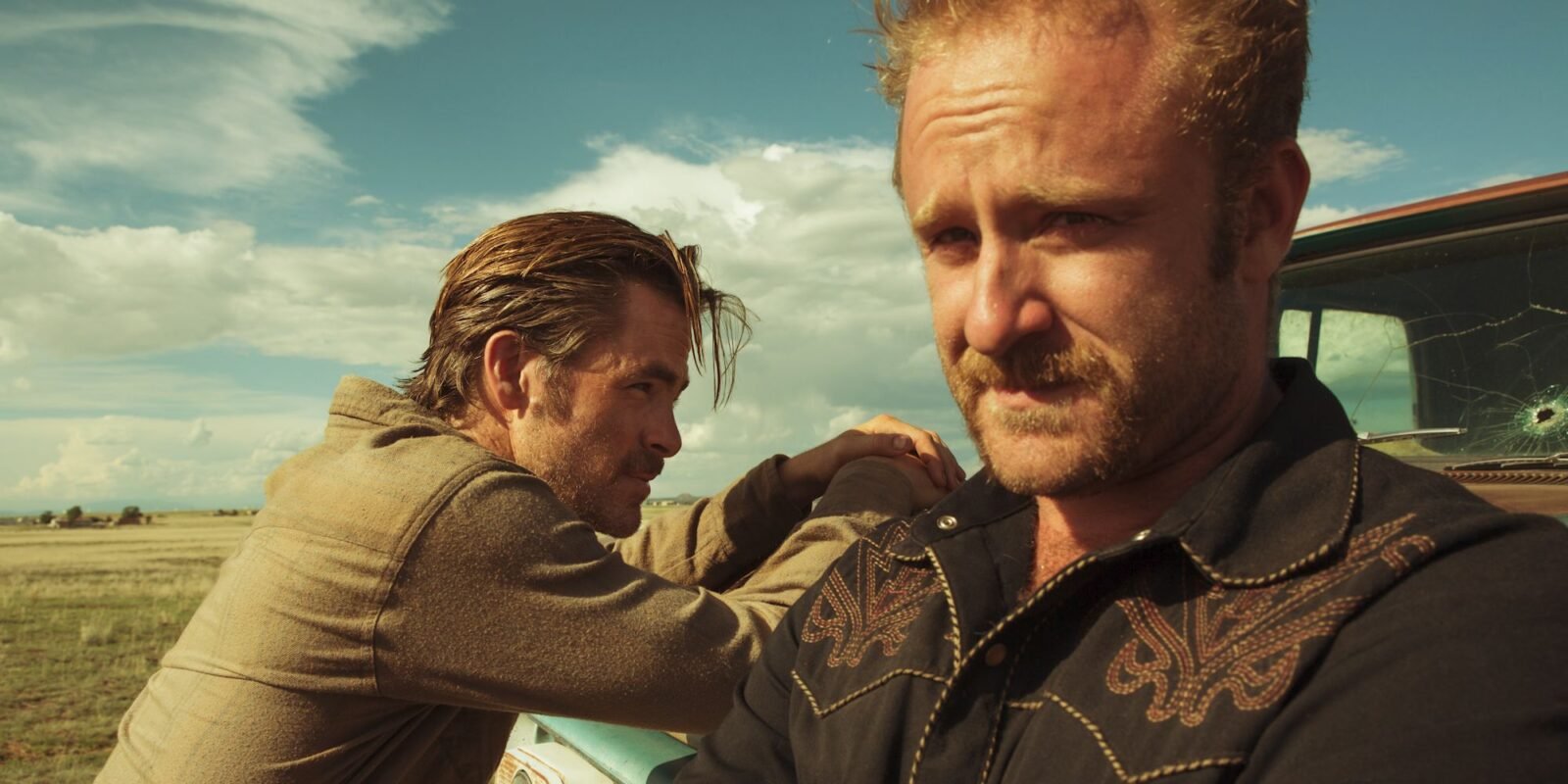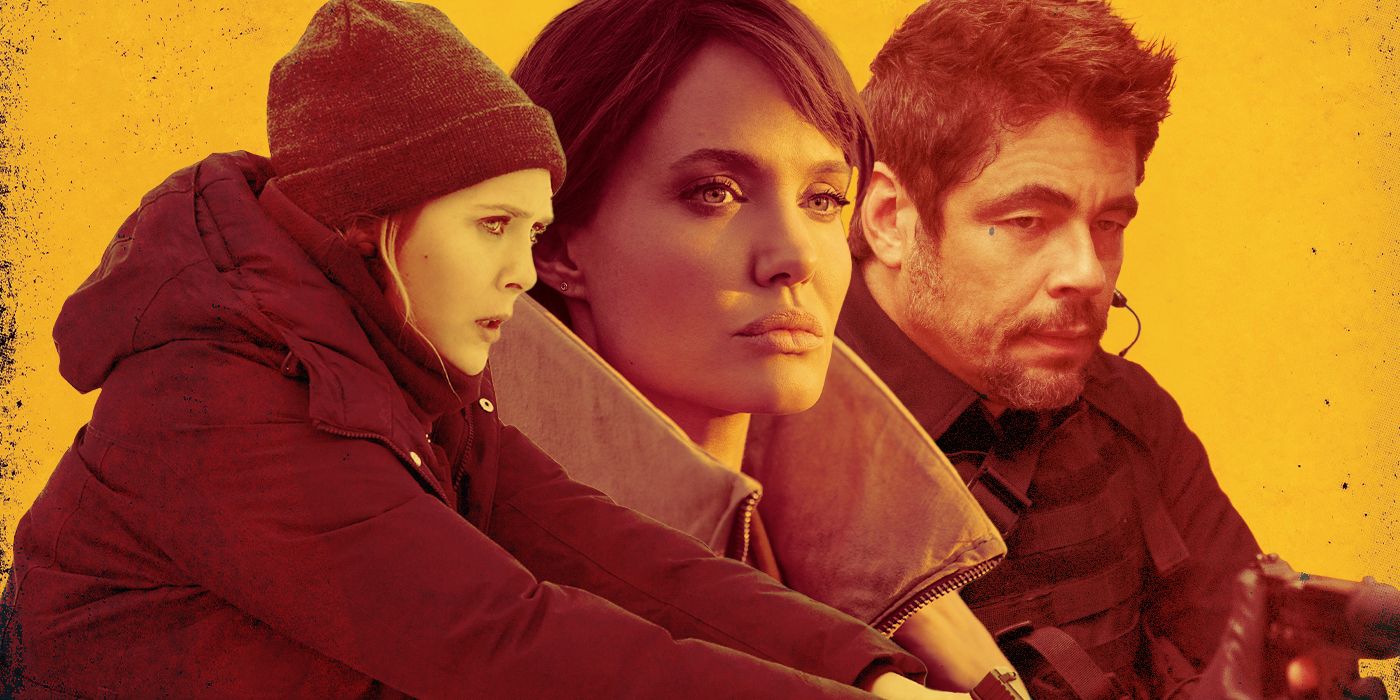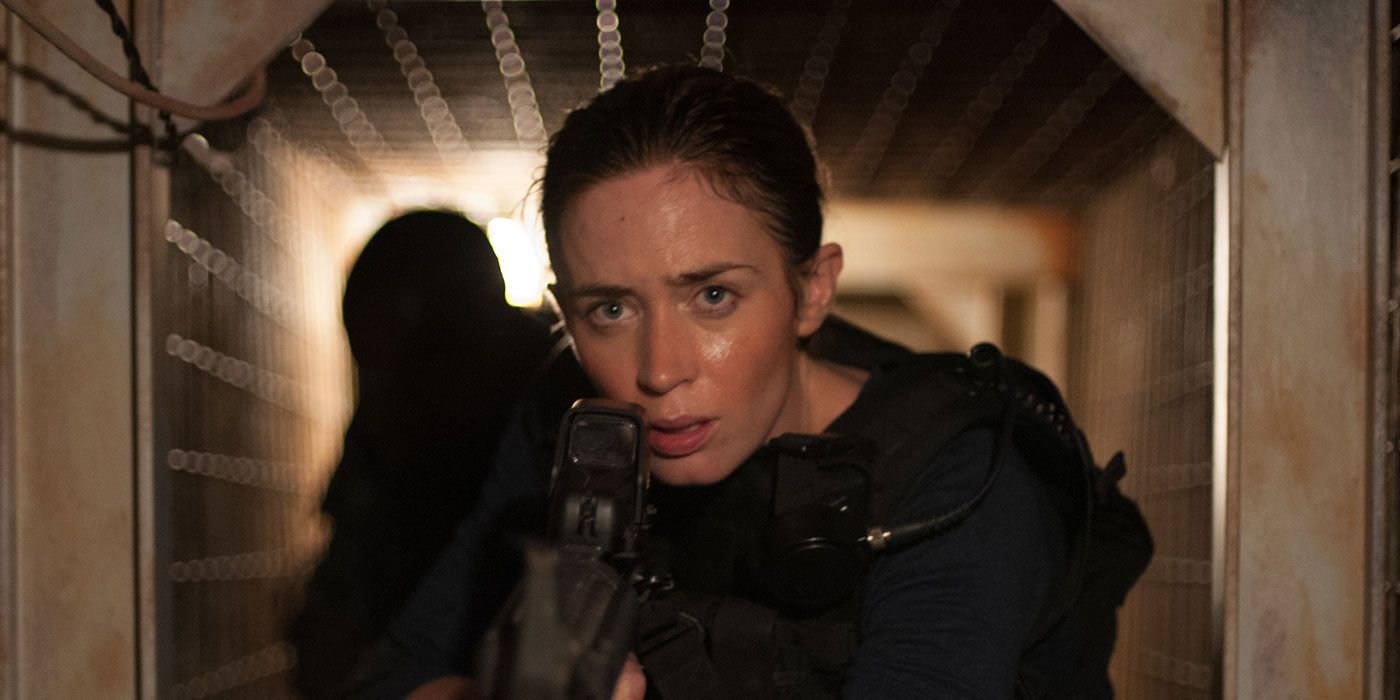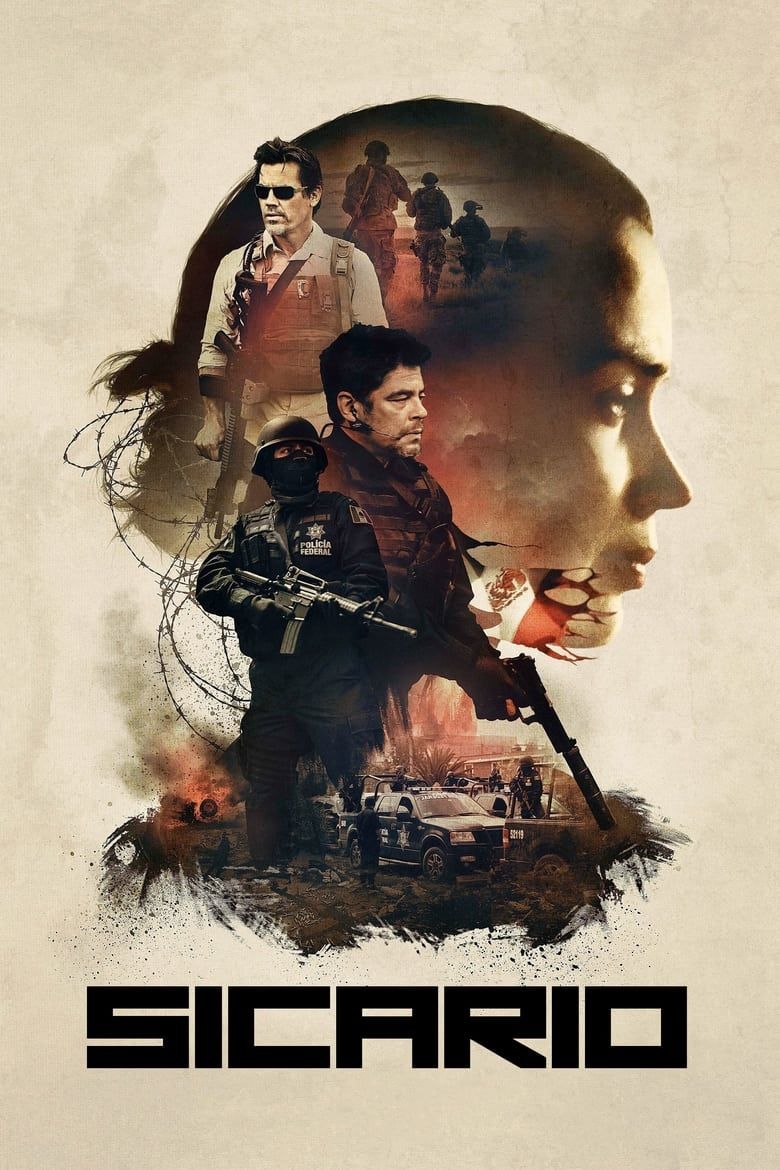Before he thrilled us with Yellowstone and his ever-growing empire of Paramount Network productions, Taylor Sheridan transitioned from his time as an actor to being a screenwriter. On spec, he penned an unofficial trilogy that is easily his most impressive work to date. More than that, it’s arguably the best trilogy of films that Hollywood has put out in about a decade. Sicario, Hell or High Water, and Wind River are each powerful examinations of the American West, though none of them are connected by character or location. Alone, they’re each meaningful and introspective films, but together, they manage to paint a distinct picture of the modern West. If you love neo-Westerns, blue-collar crime dramas, or Sheridan’s unique brand of storytelling (which, frankly, works far better in a feature film format), then the American Frontier trilogy ought to be your next binge.
Taylor Sheridan’s ‘American Frontier’ Trilogy Examines the Decline of the American West
It’s no wonder that these films have been labeled by Sheridan as the “American Frontier” trilogy. Each of them meditates on the forever-relevant themes of justice, security, poverty, fatherhood, and the cycles of violence that ensue as a result. Sheridan uses the modern American West as a backdrop to expertly dive into the hot-bedded cultural issues of our day, issues that Hollywood largely ignores. Tackling these concepts with finesse, the filmmaker sheds light on the unique problems of the Southwest and mountain states, all while telling incredible stories that thrill the audience until the credits roll. With expert performances from actors like Emily Blunt, Benicio Del Toro, Chris Pine, Jeff Bridges, Gil Birmingham, Elizabeth Olsen, and Jeremy Renner, these films are simply incredible. Thematically, they’re rich portrayals of real-life places and situations that (while none of these are based directly on true stories) feel quite possible.
Kicking off with Sicario, the trilogy begins by exposing the American government’s tempestuous relationship with Mexican drug cartels. It follows FBI Agent Kate Mercer (Blunt) as she seeks to take down the cartels while also seeing the truth about the U.S.’s involvement with them. It’s a great story, made even better by a bleak ending that refuses to solve a problem that, truth be told, has yet to be solved. Kate’s journey to the truth is painstaking, and she is never the same when it’s all over. In this sense, it takes a bird’s eye view of border politics before zooming in on the deeply personal implications. In contrast, Hell or High Water centers firmly on the death of small-town America, the “fly-over” portions of the country that the coasts couldn’t care less about. The film specifically highlights the way that the banks drove these locales into the grave. We see how this sort of greed spurs some men to break the law to secure their family’s future. While Toby Howard (Pine) plans to rob Texas Midlands Bank the same way it has others, the rebellious Tanner (Ben Foster) simply lives off the thrill of resurrecting the Wild West. In the end, “progress” wins out, but only halfway. The brother willing to assimilate survives, and the other becomes like the Natives of old.
This transitions masterfully into the third and final entry. While Sicario ends with uncertainty and Hell or High Water ends with a tragic success, Wind River rounds out the trilogy by shedding necessary light on the violence against women that has become commonplace on Native American reservations. The film goes where most refuse to, especially at the time. As FBI Agent Jane Banner (Olsen) and U.S. Fish and Wildlife Agent Cory Lambert (Renner) track down the rapist/killer of a young girl named Natalie Hansen (Kelsey Asbille), they come face to face with the depressing conditions of the Wind River Indian Reservation. It becomes clear that the Rez is an ouroboros of sorts; there is no real way out. While justice is served for Natalie, many other young women find none. The neo-Western trilogy ends with a somber reflection, pointing not just to the death of the character’s loved ones, but the death of the West as it once was. Be it due to the cartels, the government, the banks, or evil men, the American dream has vanished.
The ‘American Frontier’ Trilogy Is Stronger As Individual Entries With Different Directors
Part of what makes each of these entries so successful is that each film is helmed by a different director. Before his success with Dune, director Denis Villeneuve brought Sicario to life. His unique visual style mixes profoundly with the story beats crafted by Sheridan. Villeneuve’s penchant for long takes forces us to meditate on the horrors of the Mexican cartels, be it the bodies hung from overpasses or the soccer game briefly interrupted by the sounds of machine gun fire. It’s quite powerful when all strung together, and reinforces the isolation that Kate feels throughout the entire operation. She goes from understanding the war to being unsure about the way her country has chosen to win it.
David Mackenzie directed the second part of this saga, and he hits the nail on the head. Sweeping landscapes speak to the decay of West Texas and the death of the traditional cowboy, all while being wrapped up in a thrilling blue-collar heist that quickly goes south. “The movie feels like it’s about a big subject, and then it’s a bank robbery movie, and now it’s a film about the heart of the west,” Mackenzie told Collider back in 2016. The director’s willingness to cater to Sheridan’s unique vision and expertise is part of what makes Hell or High Water feel so authentic. “I spent a lot of time with Taylor talking through that and getting to understand it more, and we then embraced trying to find the locations, trying to get into the spirit,” Mackenzie elaborated. Even as a self-proclaimed “outsider” to Texan culture, he manages to capture Sheridan’s meditations with relative ease.
Sheridan himself only directs the final entry, Wind River. In his official directorial debut, Sheridan comes out of the gate swinging. The marriage between the characters and the land that is so prominent in the filmmaker’s Yellowstone narrative was first at play visually here. The film looks and breathes the harsh Wyoming winter, and uses those elements as a character to emphasize the way that the mountain states are largely segregated from the rest of the nation — and even more so, how the Native reservations themselves are distinctly removed from the rest of Western society. It’s a powerful picture that Sheridan constructs for us, but he pulls no punches when it comes to using space to emphasize his narrative point.
Fatherhood Is the Crux of This Three-Part Neo-Western Epic
Aside from the unique challenges and issues that the modern American West faces here in the 21st century, Taylor Sheridan grounds his American Frontier trilogy in the emotionally resonant themes of fatherhood. As Sheridan once explained in an interview with Collider, “If you think about it, it’s three fathers, each facing a failure of whether that failure was innocence or naiveté about I believe for the rule of law with Alejandro (…) with Toby in Hell or High Water, that failure is an inability to provide (…), and with Cory, his failure is trusting his child where he lives in a place where the rule of law doesn’t exist.”
Fatherhood is arguably the most important theme in Sheridan’s string of neo-Western thrillers. Del Toro’s Alejandro failed as a father by allowing his daughter to be murdered by the cartels, thus informing his entire motivation in working for the U.S. government to topple one cartel in favor of the others. If we look beyond the American Frontier trilogy, Sicario‘s 2018 sequel, Sicario: Day of the Soldado, expands on this notion even further, though the bones are quite firm in this first entry. Likewise, Wind River‘s Cory lost his own little girl to unsolved circumstances, propelling him to solve the rape and murder of his best friend’s child — and see justice done, even if outside the law. Then there’s Toby Howard, who is forced to resort to criminal activity to ensure that his two sons can live a life that he can never have himself. He refuses to let the surrounding decay affect his family, even if he has to resort to crime to do so.
Beyond these main characters, we see the ideas of fatherhood carried throughout the supporting cast as well. In Hell or High Water, Jeff Bridges’ Texas Ranger Marcus Hamilton spent so much of his life chasing criminals that he never spent much time being a father, despite referencing “the things we do for our kids.” He was always a lawman first. In contrast, Sicario‘s Silvio (Maximiliano Hernández) is a Mexican police officer who betrays the badge to provide for his family, running drugs for the cartel. Rather than dedicating his life to law and order, he betrayed those principals, which ultimately leads to his death. It’s no wonder the film ends with a harrowing picture of his wife and son alone, no longer provided for. Likewise, Gil Birmingham’s characters in both Hell or High Water and Wind River are quite tragic, as each man loses his family to the violent West; Alberto Parker is killed in the line of duty, leaving behind a large family, while Martin Hanson’s daughter suffers a terrible fate on the Rez. His drug-addicted son is set to headline Wind River: The Next Chapter, the long-anticipated sequel.
As individual films, Sicario, Hell or High Water, and Wind River are exceptional. Together, they form an American Frontier narrative that pushes the boundaries of what a trilogy should be, and manages to feel far more cohesive and relevant than many of its theatrical contemporaries.
The entire American Frontier trilogy is available to rent digitally on Prime Video.













Leave a Reply